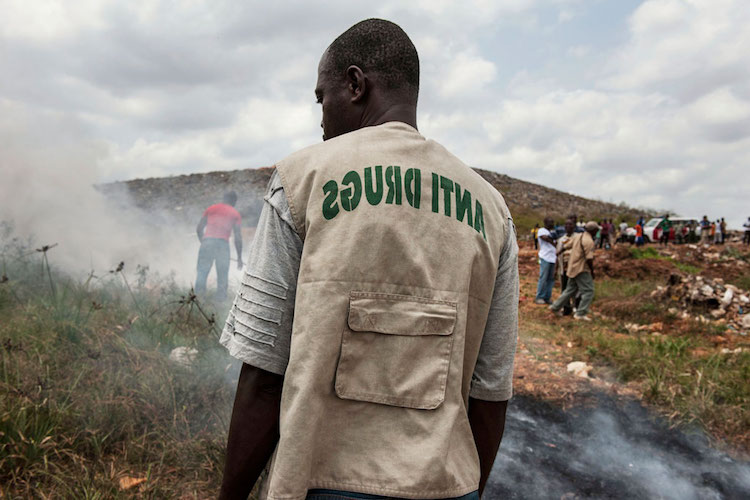NEW YORK – Marking the International Day Against Drug Abuse and Illicit Trafficking, United Nations Secretary-General June 26 called for “a global response that is simultaneously effective, compassionate and humane,” to the challenges posed by the world drug problem.
“I call on countries and communities to continue to improve the lives of everyone blighted by drug abuse by integrating security and public safety with a heightened focus on health, human rights, and sustainable development,” said the UN chief in his message on the Day.
The illicit trade in drugs fosters transnational organized crime networks, systemic corruption and widespread violence. It is also a major public health menace. Millions of people are directly affected, especially the poor, vulnerable women and children, and those living in fragile communities.
At the special session of the UN General Assembly on the World Drug Problem, held in April 2016, tangible progress was made in promoting alternatives to incarceration, fortifying human rights commitments, strengthening the focus on illicit financial proceeds, and tackling corruption.
The Sustainable Development Goals (SDGs) also informed the deliberations at the special session. Goal 3 calls on countries to strengthen the prevention and treatment of narcotic drug abuse, end AIDS and combat hepatitis. Goal 16 is designed to help to build peaceful, just and inclusive societies and institutions that can address illicit drugs, crime, corruption and terrorism.
Drug Dependent Adults Up for First Time in 6 Years
GENEVA | NEW YORK | VIENNA – Around five per cent of the adult population, or nearly 250 million people between the ages of 15 and 64, used at least one drug in 2014, according to the latest World Drug Report, released on June 23 by the United Nations Office on Drugs and Crime (UNODC). Although substantial, this figure has not grown over the past four years in proportion to the global population.
The report, however, suggests that the number of people classified as suffering from drug use disorders has increased disproportionally for the first time in six years. There are now over 29 million people within this category (compared to the previous figure of 27 million).
Additionally, around 12 million people inject drugs with 14 per cent of these living with HIV. The overall impact of drug use in terms of health consequences continues to be devastating.
This report comes soon after April’s UN General Assembly special session on the world drug problem (UNGASS), a landmark moment in global drug policy which resulted in a series of concrete operational recommendations. Collectively, these look to promote long-term, sustainable, development-oriented and balanced drug control policies and programmes.
As UNODC Executive Director Yury Fedotov noted, it is critical that the international community come together to ensure the commitments adopted at UNGASS are met – and the World Drug Report offers an important tool to assist with this task.
“By providing a comprehensive overview of major developments in drug markets, trafficking routes and the health impact of drug use, the 2016 World Drug Report highlights support for the comprehensive, balanced and integrated rights-based approaches as reflected in the outcome document which emerged from UNGASS.”
Space Technology for Wildlife Management
VIENNA | NAIROBI – More than 250 participants gathered in Nairobi on June 27 for the three-day United Nations/Kenya Conference on Space Technology and Applications for Wildlife Management and Protecting Biodiversity.
This conference is an initiative of the Vienna-based United Nations Office for Outer Space Affairs (UNOOSA), which has organized it in conjunction with the Government of the Republic of Kenya.
Pressures from climate change, ecosystem loss and wildlife crime are threatening biodiversity and wildlife around the globe. In response to this a wide range of applications, initiatives and projects have been developed that use space-based technologies to monitor, assess and manage biodiversity and ecosystems in support of sustainable environmental development.
These include imagery collected by Earth Observation satellites and satellite-derived geospatial data, satellite-communications and global navigation satellite systems. Many of these applications or initiatives are not fully known to users, but can be better promoted through dedicated awareness-raising efforts such as this conference.
The conference will therefore bring together experts from around the world involved in biodiversity and wildlife management, including representatives of space industry, governmental and non-governmental organizations, technology experts, national park authorities and rangers, and wildlife managers, to share their experiences and requirements, build cooperation and develop recommendations.
The conference is co-hosted by the United Nations Environment Programme (UNEP) and co-sponsored by the United Nations Office on Drugs and Crime (UNODC) and the European Space Agency (ESA). [IDN-InDepthNews – 27 June 2016]
Photo: A staff member of the Liberia National Police Anti-Drug Squad reviews the municipal dump outside Monrovia, Liberia. Credit: UN Photo/Staton Winter
IDN is flagship agency of the International Press Syndicate.

